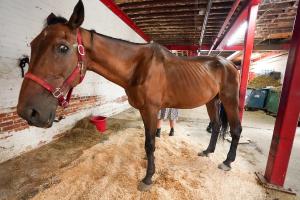Animal Group Uncovers Secret Location of Stricken NYC Carriage Horse—and It’s NOT at a Sanctuary
Center for a Humane Economy says Ryder, all 160 of city’s horses remain at risk from industry that puts the cart before the horse
“Thanks to a tenacious, sleuthing horse-rescuer in upstate New York, we know Ryder is at Clover Hill Farm in Wallkill, New York,” said Julie Marshall with the Center for a Humane Economy. “It’s good news that we know where Ryder is. But it’s bad news that he’s landed at this operation. In short, we don’t believe he’s safe at Clover Hill Farm.”
Clover Hill Farm does not have the features or practices characteristic of a sanctuary. Its central mission appears to be commercial, not centered around the idea of expertly caring for sick, abandoned, or unwanted horses or providing lifetime care and security for them.
“This farm is aligned and connected with the worst actors in the carriage-horse industry and it’s apparent that Ryder’s movement there has been designed to keep eyes off of this horse, while the industry provides false assurances that he’s recovering and at a place with excellent caretaking capacity,” said Wayne Pacelle, president of the Center for a Humane Economy.
“Ryder should be turned over to a legitimate sanctuary, and experienced, independent veterinarians should be allowed to examine the horses so we don’t see more of them collapse on city streets.”
Two weeks ago, dozens of horrified New Yorkers captured images of the frail-looking bay horse as he lay on the hot pavement. Video showed Ryder’s driver, Ian McKeever, yelling at and flogging him in attempt to rouse the animal back to his feet. Eventually, rescue workers hosed the horse with cool water. After more than an hour, Ryder finally stood, causing bystanders to erupt in cheers.
For Ryder and other horses conscripted into carriage-horse duty, though, relief from carriage duty is not the end of their imperilment. After years of dodging busy auto and truck traffic on hot summer days, sometimes in the care of drivers who are lackadaisical about ensuring proper watering and feeding, retirement often can mean brief stays on holding farms before the animals endure long, dangerous truck rides to slaughter plants in Canada or Mexico.
According to the New York Post, a vague statement by one person allegedly in the know tried to reassure Ryder’s supporters that the horse is “enjoying retirement on an upstate farm.” A photo that is unverified was offered of a similar-looking bay horse but his face was in a feed bag and could not be seen.
Officials at the Center for a Humane Economy were skeptical and, after dozens of phone calls and emails, were able to confirm the horse’s whereabouts at Clover Hill Farm in Wallkill, New York.
“Center employee and former journalist Julie Marshall posted yesterday about the whereabouts of Ryder in an in-depth column that included problems besetting the carriage-horse industry.
While Clover Hill Farm may provide stalls and longer-term care for his horses, its business model is to attract tourists and sell products—including meat and other animal-sourced items.
The website for the operation says, “Our animals live the good life”—which they may, until “it comes time to slaughter them…[when] they are taken to certified humane facilities” and sold at an “onsite meat shop.”
Clover Hill Farm offers boarding, by definition a temporary arrangement, and does not assert that it provides long-term rescue services. This means that Ryder’s placement at the facility may be short term and his long-term safety in jeopardy.
Clover Hill Farm refused multiple requests by our investigator to take photos of Ryder that could be verified, including one on Aug 29.
The Center for a Humane Economy has written about the well-being of the horse prior to his collapse and posted a report from one of its inhouse veterinarians, Dr. Jim Keen, D.V.M. The group also called for a temporary ban on all carriage-rides in NYC until exams of other horses can be examined.
ABOUT US
The Center for a Humane Economy is a non-profit organization that focuses on influencing the conduct of corporations to forge a humane economic order. The first organization of its kind in the animal protection movement, the Center encourages businesses to honor their social responsibilities in a culture where consumers, investors, and other key stakeholders abhor cruelty and the degradation of the environment and embrace innovation as a means of eliminating both.
WAYNE PACELLE
Center For A Humane Economy
+1 202-420-0446
email us here
Visit us on social media:
Facebook
Twitter
Other
Legal Disclaimer:
EIN Presswire provides this news content "as is" without warranty of any kind. We do not accept any responsibility or liability for the accuracy, content, images, videos, licenses, completeness, legality, or reliability of the information contained in this article. If you have any complaints or copyright issues related to this article, kindly contact the author above.

